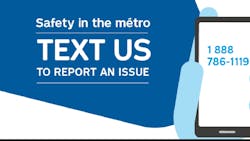STM activates text message reporting service
The Société de transport de Montréal (STM) has activated its text message reporting service. Customers can now text a phone number to report non-urgent safety concerns in the métro to STM.
Suggested by customers as a way to increase the sense of safety throughout the métro network, the new service is another way for customers to alert STM to potentially problematic situations.
STM notes the text messages are sent directly to the surveillance room, where they’re analyzed and assigned to the right resource at the right time. Safety ambassadors, special constables, the city of Montréal, Quebec’s, mobile social mediation and intervention team (EMMIS), the SPVM and maintenance staff are among the resources that can be called upon to respond.
“Our customers wanted an easy, discreet way to report hostility and other situations that could make people feel unsafe in our network,” said STM CEO Marie-Claude Léonard. “It’s also important for us to provide our customers with more services and tools so that they can feel completely confident being in our buildings. The text message service will also give our security teams more information, which will help them respond quickly and defuse situations that could adversely affect the experience of our users. The STM is joining a network of major transit agencies that already offer this service, including the [Toronto Transit Commission] in Toronto.”
STM says there are already several ways for customers to report situations requiring emergency intervention, including:
- Use the assistance stations (red phone) located at the ends of the platforms to contact the control room.
- Use the intercoms in métro cars to contact the train operator.
- Talk to station staff: station agents, maintenance staff, special constables and safety ambassadors.
- Call 911 in the event of an emergency or crime.
Increased presence in stations
Since Nov. 4, STM has increased staff presence in 13 métro stations. Teams of four, comprising special constables and safety ambassadors, are carrying out more intensive patrols. STM notes its practices at these stations, which were targeted based on data on customer complaints, employee alerts and the need for assistance when the stations are closed, could change over time.
STM says it is investing in putting more staff in the field. In June, STM added a cohort of 15 new special constables to the field, bringing the total number of constables to 180. Another 20 constables are currently in training and will be in the field in late December. A cohort of 14 safety ambassadors is currently in training and will be deployed later in November, bringing the total number of safety ambassadors to 30. In addition, métro managers are on hand during morning and evening rush hours to put customers at ease and answer questions. They wear yellow STM-branded jackets to make them easy to spot.
Other safety measures in place and the STM’s social and community approach
STM has established several partnerships and agreements in recent years to promote the presence of organizations in the network and to give vulnerable people access to the resources they need:
- Shuttles between network stations and resources (Old Brewery Mission shuttle and Navette du Nord).
- Taxi service to get to resources (if needed).
- Primary healthcare and psychosocial support services through the OBM mobile clinic (available twice a week outside of stations).
- Outreach workers from Health and Social Services present at certain stations (Laval, east end).
- Harm-reduction workers (street messengers) from CACTUS Montréal present at certain stations.
Needle drop boxes have been installed on the platforms at Papineau, Frontenac and Beaudry and outside at Joliette and D’Iberville. All special constables, EMMIS psychosocial workers, EMIC team members and safety ambassadors also carry naloxone kits.
